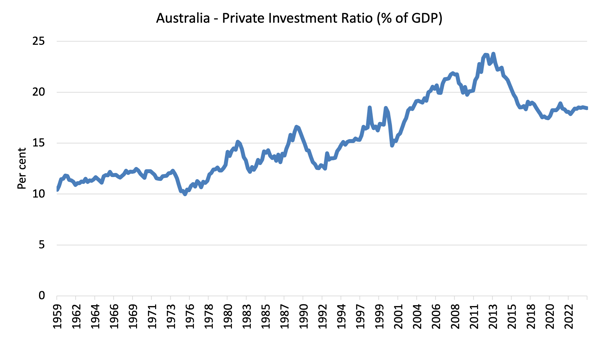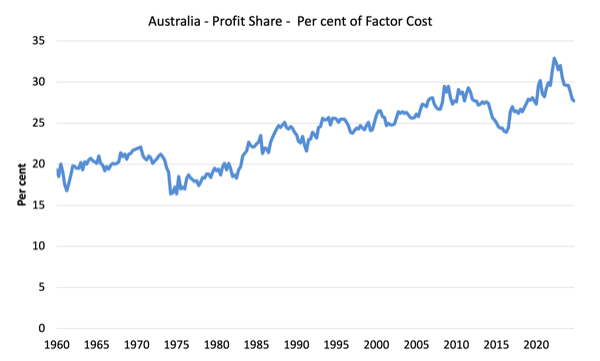In the course of the latest inflationary episode, the RBA relentlessly pursued the argument that they needed to maintain mountain climbing rates of interest, after which, needed to maintain them at elevated ranges, effectively past any cheap evaluation of the scenario, as a result of wage pressures have been set to blow up. They claimed their enterprise liaison panel was telling them that wages have been changing into an issue regardless of the information being that nominal wages progress was at document lows and actual wages (the buying energy of the nominal wages) have been going backwards at a price of knots. The RBA massaged that argument by including that productiveness was low and that there was no ‘non-inflationary’ area for wage will increase in consequence, as if it was the employees’ fault. Yesterday (Might 28, 2025), the Productiveness Fee (a federal company that morphed out of the outdated – Tariff Board – printed an attention-grabbing analysis report – Productiveness earlier than and after COVID-19 – which lays naked a few of the misinformation that the company sector has been pumping into the general public debate about productiveness progress. Specifically, it demonstrates that forcing employees to work longer hours undermines productiveness progress, that work-from-home is useful, and the shortage of funding in productive infrastructure by companies is a significant purpose for the lagging productiveness progress in Australia.
The Financial system of Excessive Wages
One of many nice contributions to institutional writing in economics, which college students within the trendy undergraduate packages don’t encounter (however ought to), got here from the work of – Sidney Webb – and – Beatrice Webb – who have been British socialists.
Sidney was a tutorial economist and based the London College of Economics and collectively they constructed the Fabian Society right into a formidable political fotce advocating progressive insurance policies.
In addition they based the New Statesman journal in 1913 and have been instrumental within the cooperative motion in Britain.
They put collectively a tremendous physique of labor individually and collectively.
William Beveridge, who motivated the introduction of the trendy welfare state in Britain, labored for the Webbs earlier after they printed their – Minority Report (Poor Regulation) – which referred to as for the abandonment of the – Poor Regulation – and the introduction of a dwelling minimal wage and common training being offered by the state.
That work considerably influenced William Beveridge’s 1942 – Beveridge Report – which laid out the structure for the welfare state.
It’s superb how the establishments they created or have been members of (such because the British Labour Social gathering) have modified a lot from their progressive origins.
Of their 1897 e-book – Industrial Democracy – the Webbs outlined the function that commerce unions and collective bargaining can play in a democratic society to enhance the fortunes of the bulk (employees that’s).
The traditional part in Chapter IV (Half III) demonstrates the gross imbalance between the facility held by employees and the facility exerted by employers:
The capitalist may be very keen on declaring that labour is a commodity, and the wage contract a discount of buy and sale like some other. However he instinctively expects his wage-earners to render him, not solely obedience, but additionally private deference. If the wage contract is a discount of buy and sale like some other, why is the workman anticipated to tip his hat to his employer, and to say ‘sir’ to him with out reciprocity?
These insights have been in stark distinction to the mainstream concept (then and now) that held out that the labour market change was nothing totally different to a marketplace for bananas or some other commodity.
Within the mainstream narrative there are not any energy imbalances and commerce unions are thought-about to be market imperfections that needs to be eradicated to permit the demand and provide forces to work extra completely.
They devoted their lives to researching the situation of the working class and growing institutional narratives to enhance the place of that class.
Importantly, for the needs of right now’s weblog publish, they wrote in that e-book that the productiveness of employees is a optimistic perform of the wage paid,
Employees have been extra motivated and wholesome in workplaces that paid greater wages.
They argued that even small additions to wages or situations have been useful to the enterprise, opposite to the mainstream considering (p.690):
Therefore a relatively small addition to weekly wages, a extra equitable piecework record, a bigger diploma of consideration in fixing the hours for starting or quitting work, the intervals for meals and the preparations for holidays, better care in offering the little comforts of the manufacturing facility, or in rendering not possible the petty tyrannies of foremen, — any of those ameliorations of the situations of labor will suffice, with out severe inroads on earnings, to draw to a agency the most effective employees within the city, to achieve for it a status for justice and benevolence, and to provide the employer’s household an abiding sense of satisfaction every time they enter the works, or cross the thresholds of their operatives’ house
They talked about some great benefits of an “financial system of excessive wages” which improves productiveness, reduces turnover, and encourages ability growth and innovation.
Their work greater than a century in the past nonetheless resonates strongly right now and stands in stark distinction to the best way mainstream economists and the enterprise group discuss wages – as if they’re an impost that needs to be minimised and the laws that help wage safety needs to be abolished or watered down.
The Webbs noticed {that a} nation may comply with the ‘race to the underside’ method the place competitors is prioritised and unregulated such that cost-cutting is deemed useful, labour commodified (that’s, dehumanised) and employees are deskilled and compelled to work longer hours within the office.
You possibly can see these pressures within the trendy interval.
Even the opposition to the work-from-home development which Covid-19 precipitated as a matter of survival, is a part of that company technique to manage employees.
The Webbs thought that method was not a successful components for a excessive productiveness society.
Conversely, they advocated a excessive wage financial system the place employees are protected with a robust regulative framework and produce prime quality services utilizing the most recent know-how.
As a substitute of bashing down employees to the bottom frequent denominator, the Webbs wished employers to spend money on best-practice know-how and deal with their workforces with dignity and pay excessive wages.
Productiveness Fee findings 2025
Within the aftermath of the extremely restrictive interval of the present Covid-19 pandemic, productiveness has fallen sharply in Australia.
Enterprise sorts blame employees for this – an excessive amount of work-from-home and an excessive amount of regulation by authorities.
The enterprise foyer continuously argues for wage suppression, longer working hours, much less protections and many others.
The traditional line with none proof to help it.
However the Productiveness Fee (PC) report cited above rejects these claims.
They discover that the drop in productiveness lately is the results of employees working extreme hours.
They stated:
… the tempo of progress in hours labored introduced with it some downsides to labour productiveness (which may have resulted in wages being gradual to rise) … the capital inventory was merely unable to maintain tempo with the expansion in hours labored …
In addition they discovered that the work-from-home development that has boomed for the reason that pandemic started has not diminished the productiveness of employees regardless of a large foyer supported by the enterprise sector arguing that with out “in-person interactions” productiveness slumps.
The Report considers the proof on “hybrid work” and notes (p.54):
Employees don’t should be within the workplace full-time to expertise the advantages of in-person interactions. In consequence, hybrid work (working some days remotely and a few days within the workplace) tends to be useful to productiveness, or no less than, shouldn’t be detrimental to productiveness …
Permitting employees to do business from home some days can enhance employee satisfaction … and permits folks to profit by avoiding the commute to work, that means they’ve extra time for different functions …
… hybrid work is related to greater amount and novelty of output in comparison with employees who’re full time within the workplace or full time working remotely.
Importantly, the PC argues that “long term funding has been low” or in decline for a number of many years because of companies not diverting the beneficial properties they comprised of wage suppression into greater funding in best-practice know-how.
The low wages progress setting has made it simpler for firms to generate greater earnings for shareholders with out having to maintain tempo with innovation.
The PC observe that one of many causes for the low enterprise funding is the “rising market energy of companies”:
… as companies can improve income by marking-up costs slightly than rising output. Theoretically, companies with extra market energy might have much less incentive to supply output and construct capability, due to this fact lowering capital accumulation
Therefore the low productiveness setting.
This graph exhibits the personal enterprise funding to GDP ratio (the share of personal capital formation expenditure in whole expenditure) from 1959 to December 2024.
The decline within the enterprise funding ratio since 2010 is obvious and a basic purpose why productiveness progress is slumping.
One is likely to be tempted to say that it is because earnings haven’t grown sufficiently.
Which might be false.
Enterprise earnings are at document ranges and there was a big redistribution of nationwide revenue in direction of earnings on the expense of wages over the past 4 many years.
This graph exhibits the revenue share of nationwide revenue for Australia.
Conclusion
Sidney and Beatrice Webb understood all of this greater than a century in the past however the pursuits of capital have at all times railed towards their work.
An financial system of excessive wages is the positive path to a extremely productiveness financial system.
There’s a plethora of analysis supporting that place.
The neoliberal interval has seen the stability of energy tilt again to employers and capital, which has engaged within the antithesis of that method.
And now the outcomes are fairly clear – document low wages, precarious work, longer working hours, much less enterprise funding in best-practice applied sciences, diminished job stability, and on the finish of the causal chain – stagnant productiveness.
That’s sufficient for right now!
(c) Copyright 2025 William Mitchell. All Rights Reserved.

